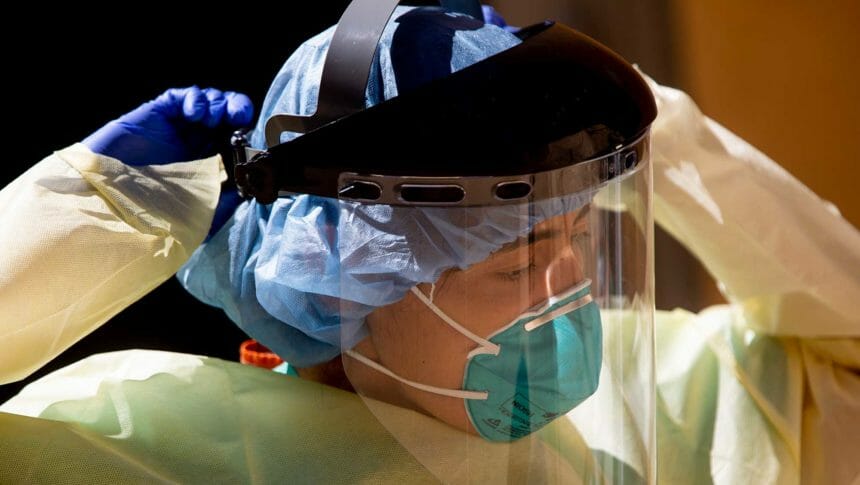
The American Health Care Association / National Center for Assisted Living on Wednesday repeated a call to state and federal governments to prioritize COVID-19 testing, staffing and emergency funding to help support residents and caregivers in the nation’s assisted living and skilled nursing facilities throughout the country. The effort came as another association launched a campaign to call attention to the need for personal protective equipment in senior living.
Mark Parkinson, AHCA / NCAL president and CEO, said state and federal government agencies should provide expanded and priority testing for nursing homes and assisted living communities, as well as emergency funding to help caregivers respond to the COVID-19 outbreak in long-term care facilities, which he said care for approximately 5 million people annually.
“When you look back over the last couple of months, the long-term care profession has been left out, forgotten, and residents have not had the resources they need in this battle,” Parksinson said during a Wednesday news conference. “It’s time to turn that around. We are asking the country to rally around our nursing homes and assisted living communities the same way the public health sector has around hospitals. That means expanded testing, more PPE and urgently needed funding from the federal government for both residents and caregivers.”
The inability of long-term care facilities to obtain equipment, particularly face masks, has proven “tragic,” Parkinson said, adding that the delay in prioritizing these facilities for testing has added fuel to the fire.
“Our dedicated and heroic caregivers are working around the clock to keep our residents safe. But they need help,” he said. “Our profession has been sounding the alarm for weeks and weeks, but we have largely been forgotten by the public health sector. If we are not made a top priority, this situation will get worse, with the most vulnerable in our society being lost.”
Parkinson said long-term care facilities are engaging in an “epic battle” to keep COVID-19 out of buildings or contain it by spending extreme amounts of money on equipment — when it’s available — and overtime and “hero payments” to staff. He said the U.S. Department of Health and Human Services has ample funds to help healthcare providers fight this battle.
The CEO called on the federal government to create a $10 billion fund for nursing facilities, similar to what HHS did for hospitals. Although Parksinson said he understood prioritizing hospitals in the first stage of funding, he said it’s time to turn attention to long-term care facilities, “where the battle continues to take place every single day.”
“We think future rounds of funding should be focused on where COVID-19 is being fought front and center, and that place is in skilled nursing and assisted living facilities,” he said.
Parkinson said the announcement from Vice President Mike Pence on Monday that the Federal Emergency Management Agency will be expediting the direct shipment of PPE supplies to the nation’s more than 15,000 nursing homes will improve the situation in those settings in the coming weeks and months.
Argentum and American Seniors Housing Association leaders, however, previously said the Trump administration’s plan to exclude independent living, assisted living, memory care and continuing care retirement communities from the PPE distribution could have “grave consequences” for the 2 million residents and 1 million staff members who live or work in senior living communities.
Earlier this week, Argentum launched an advocacy campaign, Standing With Seniors, to encourage senior living providers to call on Congress to prioritize PPE, testing and financial support for senior living communities. Congress is expected to act soon on its fourth major legislative package, following up the $2.2 trillion CARES Act and supplemental funding.
In terms of testing, nursing facilities initially worked with private labs that had more access to testing, Parkinson said Wednesday. But the results of those tests often lagged seven to 10 days because they were not priority level one. The lag time is shrinking, and he said he hopes the U.S. Center for Disease Control and Prevention’s decision to prioritize testing for nursing home residents and staff will improve the ability to not only secure test kits, but to obtain results faster.
Parkinson said many long-term care providers that were able to expand testing found a high number of COVID-positive people who were asymptomatic. Without access to testing and quick results, nursing homes and assisted living communities are at a severe disadvantage, he said.
Parkinson said the number of COVID-19 cases in nursing homes across the globe is discouraging. He said the World Health Organization reported as many as 50% of cases in Europe are in long-term care facilities, whereas Canada reported that 80% of COVID-19 deaths are in long-term care facilities. In the United States, that number stands around 20%.
For states considering opening back up, Parkinson has a warning.
“If states reopen too quickly and another spike in COVID-19 occurs in communities and states, there will be a spike in COVID-19 cases in any congregate care setting,” he said, adding that long-term care facilities will respond by doubling down on infection control procedures and limiting visitors. “Governors have to be careful about what they allow to happen in states because it will have an impact on buildings,” he said.




